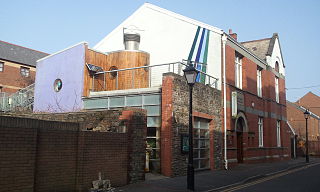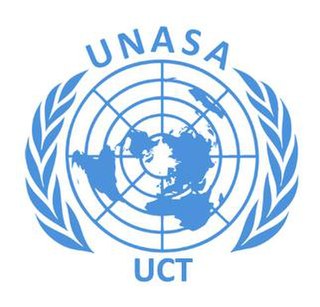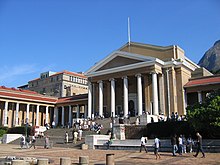Related Research Articles

The University of Cape Town (UCT) is a public research university in Cape Town, South Africa. Established in 1829 as the South African College, it was granted full university status in 1918, making it the oldest university in South Africa and the oldest university in Sub-Saharan Africa in continuous operation.
Planet Ark Environmental Foundation is an Australian non-profit environmental organization founded in 1992. Planet Ark works with partners in the public and private sectors to help find the simple ways in which their partners can reduce their impact on the planet. They focus on the environmental impacts of human consumption in the home, the workplace, and the community. It is best known for its high-profile recycling campaigns including 'Cartridges 4 Planet Ark', Australia's 'National Recycling Week', and the country's biggest annual community tree planting event, National Tree Day. The organisation is operated from its office in Sydney.
GCI may refer to:

Green building refers to both a structure and the application of processes that are environmentally responsible and resource-efficient throughout a building's life-cycle: from planning to design, construction, operation, maintenance, renovation, and demolition. This requires close cooperation of the contractor, the architects, the engineers, and the client at all project stages. The Green Building practice expands and complements the classical building design concerns of economy, utility, durability, and comfort. Green building also refers to saving resources to the maximum extent, including energy saving, land saving, water saving, material saving, etc., during the whole life cycle of the building, protecting the environment and reducing pollution, providing people with healthy, comfortable and efficient use of space, and being in harmony with nature Buildings that live in harmony. Green building technology focuses on low consumption, high efficiency, economy, environmental protection, integration and optimization.’
Green computing, green IT, or ICT sustainability, is the study and practice of environmentally sustainable computing or IT.
A Revolving Loan Fund (RLF) is a source of money from which loans are made for multiple small business development projects. Revolving loan funds share many characteristics with microcredit, micro-enterprise, and village banking, namely providing loans to persons or groups of people that do not qualify for traditional financial services or are otherwise viewed as being high risk. Borrowers tend to be small producers of goods and services: typically, they are artisans, farmers, and women with no credit history or access to other types of loans from financial institutions. Organizations that offer revolving loan fund lending aim to help new project or business owners become financially independent and eventually to become eligible for loans from commercial banks.

Eco-Schools is an international programme of the Foundation for Environmental Education (FEE) that aims to “empower students to be the change our sustainable world needs by engaging them in fun, action-orientated, and socially responsible learning.”

The sustainable city, eco-city, or green city is a city designed with consideration for social, economic, environmental impact, and resilient habitat for existing populations, without compromising the ability of future generations to experience the same. The UN Sustainable Development Goal 11 defines sustainable cities as those that are dedicated to achieving green sustainability, social sustainability and economic sustainability. They are committed to doing so by enabling opportunities for all through a design focused on inclusivity as well as maintaining a sustainable economic growth. The focus also includes minimizing required inputs of energy, water, and food, and drastically reducing waste, output of heat, air pollution – CO2, methane, and water pollution. Richard Register first coined the term ecocity in his 1987 book Ecocity Berkeley: Building Cities for a Healthy Future, where he offers innovative city planning solutions that would work anywhere. Other leading figures who envisioned sustainable cities are architect Paul F Downton, who later founded the company Ecopolis Pty Ltd, as well as authors Timothy Beatley and Steffen Lehmann, who have written extensively on the subject. The field of industrial ecology is sometimes used in planning these cities.

A green-collar worker is a worker who is employed in an environmental sectors of the economy. Environmental green-collar workers satisfy the demand for green development. Generally, they implement environmentally conscious design, policy, and technology to improve conservation and sustainability. Formal environmental regulations as well as informal social expectations are pushing many firms to seek professionals with expertise with environmental, energy efficiency, and clean renewable energy issues. They often seek to make their output more sustainable, and thus more favorable to public opinion, governmental regulation, and the Earth's ecology.
Green building on college campuses is the purposeful construction of buildings on college campuses that decreases resource usage in both the building process and also the future use of the building. The goal is to reduce CO2 emissions, energy use, and water use, while creating an atmosphere where students can be healthy and learn. Universities across the country are building to green standards set forth by the USGBC, United States Green Building Council. The USGBC is a non-profit organization that promotes sustainability in how buildings are designed and built. This organization created the Leadership in Energy and Environmental Design (LEED) rating system, which is a certification process that provides verification that a building is environmentally sustainable. In the United States, commercial and residential buildings account for 70 percent of the electricity use and over 38 percent of CO2 emissions. Because of these huge statistics regarding resource usage and emissions, the room for more efficient building practices is dramatic. Since college campuses are where the world's future leaders are being taught, colleges are choosing to construct new buildings to green standards in order to promote environmental stewardship to their students. Colleges across the United States have taken leading roles in the construction of green building in order to reduce resource consumption, save money in the long run, and instill the importance on environmental sustainability on their students. It is a better way to motivate new generation to live a sustainable life.
The California Sustainability Alliance is an organization funded by the California IOUs, to facilitate discussions between various industries on the issues of resource sustainability. The Alliance was set up in 2008 to help California meet its goals in facing Climate change in the State, in relation to energy, resources and the environment. Efforts are directed at increasing and accelerating sustainable measures and strategies. The Alliance specifically focuses on energy efficiency, climate action, “smart growth” principles, renewable energy development, water-use efficiency, waste management, and transportation management within California.
A sustainability organization is (1) an organized group of people that aims to advance sustainability and/or (2) those actions of organizing something sustainably. Unlike many business organizations, sustainability organizations are not limited to implementing sustainability strategies which provide them with economic and cultural benefits attained through environmental responsibility. For sustainability organizations, sustainability can also be an end in itself without further justifications.

The Environment Centre in Swansea, Wales, is an independent charity organisation for environmental information, education and activity. Environment Centre may also refer to the building the charity is located in.

"Sustainability," was defined as “development which implies meeting the needs of the present without compromising the ability of future generations to meet their own needs”as defined by the 1983 Brundtland Commission. As sustainability gains support and momentum worldwide, universities across the United States have expanded initiatives towards more sustainable campuses, commitments, academic offerings, and student engagement.

The United Nations Association of South Africa University of Cape Town is an official chapter of the United Nations Association of South Africa (UNASA) and affiliated to the World Federation of United Nations Associations. UNASA UCT is a registered political society at the University of Cape Town. The aim of the society is to work in collaboration with various stakeholders in South Africa to promote and support the goals, vision and principles of the UN and its agencies.
In an effort to create a more sustainable environment, Clemson University, located in Clemson, South Carolina, has developed several initiatives to conserve energy and educate students along with the public about fossil fuels and natural resources. Clemson has set both short- and long-term goals, on a scale of up to 15 years. Known as the Solid Green campaign, Clemson has a mission to reduce total energy used by 20% in the year 2020, reach a goal of becoming net-zero in carbon emissions, and replace the coal-fired boiler in 2015. Clemson has the long-term desire to become much more energy efficient, climate considerate and recycle more. One way of funding these initiatives is the Student Sustainability Fee, also known as the Green Fee, which students can elect to pay $10 with their tuition each semester.

Food waste recycling is a process to convert food waste into useful materials and products for achieving sustainability of the environment. Food waste is defined as all parts of food, inedible and edible, created before, during, and after food processing, production, and consumption. Greenhouse gases, especially methane can be reduced by food waste recycling. Food waste recycling can also alleviate the saturation of landfill sites in Hong Kong.

Adenike Adebukola Akinsemolu is a Nigerian Environmental sustainability advocate, educator, author and a social entrepreneur. She is a lecturer at Obafemi Awolowo University. She is known as one of the country's leading experts on environmental sustainability.
A climate-friendly school, or eco-school, encourages the education of sustainable developments, especially by reducing the amount of carbon dioxide produced in order to decrease the effects of climate change. The term "climate-friendly school" arose and was promoted by the United Nation's education for sustainable development program (ESD).
In Egypt, waste and lack of proper management of it pose serious health and environmental problems for the country and its population. There has been some governmental attempts to better the system of waste management since the 1960s but those have not proven sufficient until now. In the last 10 years focus on this issue and solutions to it has increased both from the government and civil society. Some attempts at recycling are present, and growing in the country. But these are largely informal or private actors, and government initiatives are necessary to properly manage these systems and provide them with appropriate resources.
References
- ↑ "University of Cape Town (South Africa) – The Talloires Network". Tufts.edu. Archived from the original on 18 May 2012. Retrieved 4 January 2013.
- ↑ "University of Cape Town Green Campus Initiative". Open Green Map. Retrieved 4 January 2013.
- ↑ "helps green UCT". Hemporium. Retrieved 4 January 2013.
- ↑ Archived 11 July 2010 at the Wayback Machine
- ↑ "Archived copy" (PDF). Archived from the original (PDF) on 24 July 2010. Retrieved 12 September 2010.
{{cite web}}: CS1 maint: archived copy as title (link)
